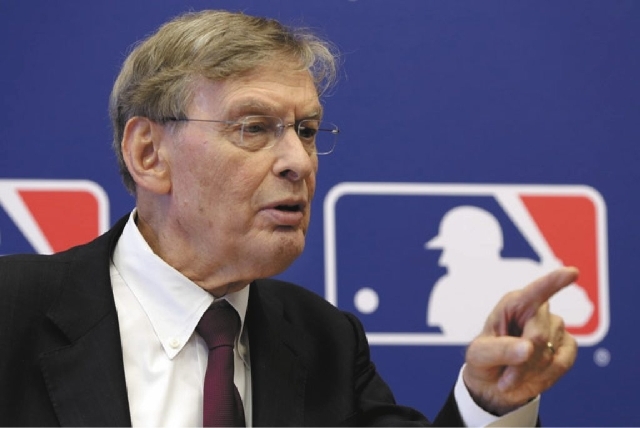Political thinking: Don’t bet on any MLB players getting suspended

The difficult part, for once, is coming down hard on Bud Selig and Major League Baseball. But before handing the sport’s top executives gold stars for drawing a line when it comes to chasing those cheaters that still exist on the base paths, know that situations like this are always defined by an underbelly of political strategy.
In other words, this is what you get in a collectively bargained professional sports league — one side wanting to improve its position on a specific point (drug testing) and the other fighting it at every turn.
On the surface, reports that baseball will seek to suspend about 20 players for their connection to a Miami-based clinic and the distribution of performance-enhancing drugs is a positive example of MLB continuing to try to clean up a sport soiled and shamed by the steroids era.
It’s big news. Important stuff.
If anything, Tuesday’s news allowed us to again wonder the level of stupidity Ryan Braun can possibly exhibit during one career, given he is named as one of those MLB wants to discipline.
This, after the Milwaukee Brewers outfielder and former Most Valuable Player had a failed drug test in 2011 overturned on appeal, a test that showed a testosterone ratio of 20:1, or what you would expect to find in your average racehorse.
Alex Rodriguez is also facing a suspension of upward of 100 games, but it was more of a shock to learn anyone other than women he seeks telephone numbers from during games still considers him relative enough to care about.
The truth: I’m not holding my breath on any of these suspensions being carried out once the players’ association again stands behind its juiced clients and begins an appeals process that would occur before an arbitrator.
Baseball’s evidence against the players probably would be based on a nonanalytical positive — essentially, accusing and trying to convict them without a positive test — and the documentation and testimony offered would have to be overwhelming in scope to believe any decision would fall on the side of Selig’s office.
Have you seen Tony Bosch, founder of the closed Biogenesis of America lab at the center of this drug scandal, the person who practiced medicine with a fake degree and who now has agreed to cooperate with MLB?
Something tells me this guy might rival the FBI tire analyst in “My Cousin Vinny” as the worst witness known to mankind.
You have to think the union’s toughest job again might be defending the likes of Braun against public perception because, well, if you still don’t believe he ingested testosterone like most do water, you should probably also second-guess that poster of Lance Armstrong hanging on your wall.
At best, we can hope baseball’s latest drug scandal eventually leads to the type of testing that would make these types of stories disappear for good.
It’s a positive step that baseball implemented blood testing for HGH during the regular season, but its continued lack of any teeth within testing for synthetic testosterone continues to allow players to cheat their way through the game.
Until a player no longer can leave the ballpark at night, use a testosterone gel or patch or lozenge and be certain it will be undetectable if he is tested the following day, baseball’s testing program remains far more a joke than Selig wants anyone to believe.
Until the game (which can afford it, by the way) adopts the Carbon Isotope Ratio test on a random basis and finally offers a screening that can detect elevated levels of testosterone for up to a few weeks, baseball’s boasting about being tough on cheaters will fall incredibly short and players will continue getting around tests they have beaten for years.
Maybe that’s the play here. Selig must know the uphill climb he faces in trying to suspend 20 players, but perhaps he’s hoping any public pressure put on the union due to whatever evidence Bosch produces finally forces it to concede more when it comes to drug testing now or in the future.
It’s a move you often find in the world of collective bargaining agreements. Selig acts the tough guy who wants more than anything else a clean sport, but at day’s end, his main objective is to cut the best deal possible for owners. The union, on the other hand, preaches about players desiring a tough testing program while protecting their legal rights.
It’s all one big political mess fueled by a sport that wants you to accept it’s getting tougher on drugs and yet is handcuffed in its pursuit of cheaters by the realities of a negotiating table.
Las Vegas Review-Journal sports columnist Ed Graney can be reached at egraney@reviewjournal.com or 702-383-4618. He can be heard from 11 a.m. to 2 p.m. Monday through Friday on “Gridlock,” ESPN 1100 and 98.9 FM. Follow him on Twitter: @edgraney.